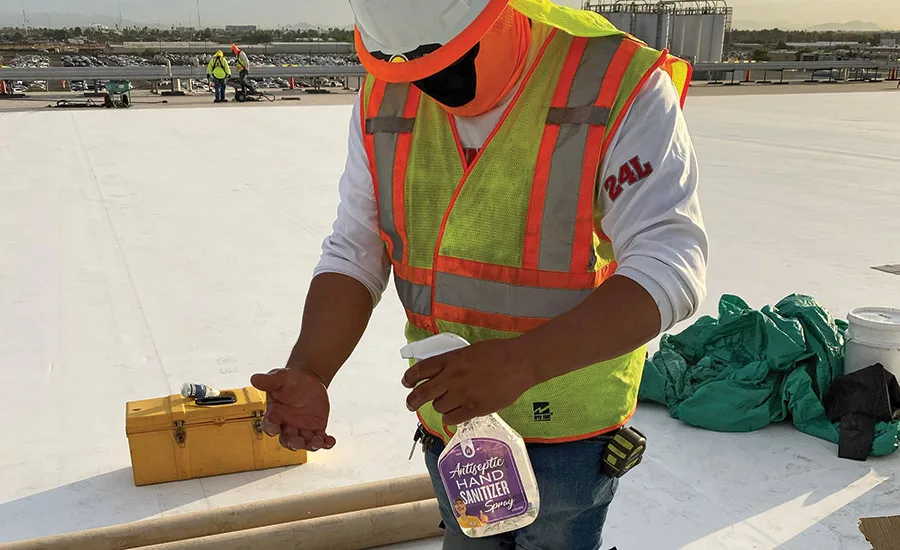COVID-19 Crisis: Roofers Re-emerge with Technology

Roofing crews around the country, like those with D. C. Taylor Co. in Iowa, have been sanitizing hands and tools, washing hands and using masks to protect themselves and customers during the pandemic. Photo courtesy of D. C. Taylor Co.

D. C. Taylor Co. employees use digital thermometers to check the temperatures of employees before they can begin working. Photo courtesy of D. C. Taylor Co.
Roofing contractors that pushed through the economic turmoil caused at the outset of the COVID-19 pandemic relied heavily on technology in ways that are bringing lasting changes to how they do business.
From coast to coast, roofers repeatedly said they wouldn’t be able to keep current customers at ease, much less target and convert new ones without the prevalence and ease of video conferencing and instant messaging. Others noted that if not for interactive tools and technology, they couldn’t maintain a semblance of worker safety required to make employees feel comfortable returning to the same work roles performed prior to the crisis.
“The first thing we did was make sure all of our people felt safe and comfortable that they could be here. And then we decided that if we were going to be here, we were going to focus on the things we could control, and just ignore everything else,” said Rhett Seekins, owner of Select Construction in Fort Worth, Texas.
Seekins knew employees needed to reflect that same attitude toward safety externally to its mix of residential and commercial roofing clients. Now all employees carry face masks branded with the company’s hashtag that they’re required to wear when around customers.
“Those are things we’re talking about in our meetings now where it used to be just a sales meeting, where we’d talk about our wins. Now, we definitely have to think about it,” he said.
Seekins also needed to start thinking about ways to generate new leads and respond to demand ahead of the competition, particularly with the volatile storm season underway in North Texas. Recognizing the company’s current software didn’t support email campaigns very well, Seekins swapped out the entire customer relationship management (CRM) system when the COVID-19 lockdown started.
“Deep down, I’m a ‘If it ain’t broke, don’t fix it’ guy, but to me it’s about growth, and I want to make sure we’re always growing,” he said.
The commitment to technology is also working in the commercial sector in the same market. Dallas-based Priority Construction started a contact-less inspection process where sales reps don’t even approach the front door.
“They’ll get images from the drone, send a video link to them, get on a (video conference) and walk customers through the process,” said Jonathan Sherwood, president of Priority’s commercial roofing division. “It’s a completely contact-less inspection, appointment and contract.”
Proceed with Caution
The influx of technology into the roofing industry since the pandemic’s start has no doubt been essential to a contractor’s business survival. But it isn’t without risk. By early May, roofing contractors were reporting issues with cyber breaches, phishing scams to gather personal information, and blatant attempts to steal money through wire fraud. Companies that were vulnerable found themselves fighting off attempts to gather information about their employees, customers and vendors.
Working from home offices where cybersecurity measures may not be as strong as office networks exacerbates the problem.
“There’s a lot of opportunities that expose companies to breaches,” said Trent Cotney, of Cotney Construction Law. “You’ve got to put those precautions in place as a contractor so you can mitigate the risk. Unfortunately, it’s not a matter of if, it’s a matter of when, and I think we’re going to see a lot more of this.”
Identifying the amount and nature of sensitive information stored in a company’s database is the first crucial step, quickly followed by a plan with data-protection protocols. He said it’s critical to regularly monitor data security and implement best practices such as verifying all wire transactions and emailed invoices to stay ahead of potential fraud. Some contractors Cotney advises even purchased cyber-liability insurance.
Out of dozens of roofing contractors and subcontractors he advises in the Rocky Mountain region, Brad Moody, president and owner of Moody Insurance Agency in Denver, estimates only 25% consider cyber-insurance essential. Those times have changed.
“With everyone going to mobile devices it’s a big concern, and you’re also seeing a lot of people that aren’t used to being remote or communicating virtually. They’re vulnerable,” Moody said.
Pushing Forward
Contractors weren’t the only businesses in the industry forging ahead with bold technology despite uncertain times.
This month, GAF will formally roll out GAF Project, a comprehensive digital selling platform for roofers that integrates dozens of different roofing software and service features.
Designed with contractor input, the tool allows roofers to sell in-home or virtually by connecting multiple sales functions into one integrated platform that provides a consistent and enhanced sales experience with improved customer engagement. The company initially set out to design an in-home selling app, but quickly switched gears when COVID-19 safety precautions changed customer behaviors almost instantly.
“This is not just a CRM or a production tool, it’s an all-encompassing tool that allows you to manage your roofing project from lead to payment,” said Vishal Laddha, GAF’s director of marketing for contractor programs.
In May, AccuLynx launched several new features — ranging from automated emails and texting features to ordering materials and payment processing — to give roofing contractors the ability to collaborate more effectively and service more homeowners. The company’s internal data indicates its cloud-based platform acts as a link for roofing companies trying to move projects forward while prioritizing safety, CEO Mike Stein said.
“While the coronavirus outbreak has undoubtedly presented challenges for roofing contractors, we have seen the power technology can have on their ability to navigate them,” he said. “Our customers have demonstrated resilience throughout this unprecedented time, with our software playing a critical role in keeping their project teams connected and work moving forward.”
He added that aggregate customer job data remained stable despite states enacting social distancing measures.
Contractors and the technology providers helping them through this crisis continue to show growth is certainly possible in tough times. And much of it has to do with attitudes.
Seekins said where his company once used to plant seeds for future business by focusing on referrals and branding, they aggressively went after new sales and found fertile territory in the midst of a pandemic.
“We were more farmers, not hunters, and I thought maybe we need to hunt a little bit more,” Seekins said. “We didn’t cut one thing, we added people, we added trucks, we added new strategies. We’re a lot better now.”
Looking for a reprint of this article?
From high-res PDFs to custom plaques, order your copy today!







